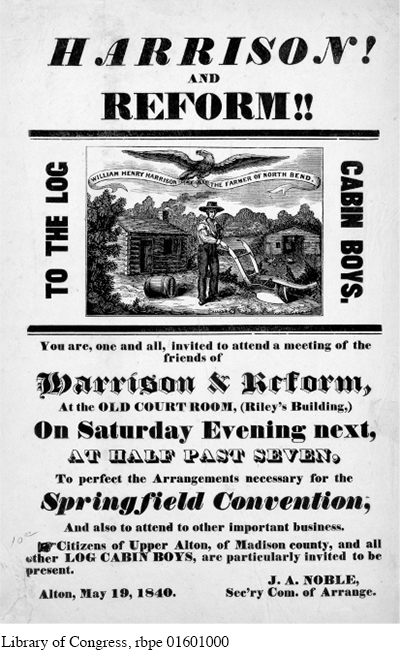The Whigs Win the White House
Eager to exploit the weakness of Van Buren and the Democrats, the Whig Party organized its first national convention in fall 1840 and united behind military hero William Henry Harrison. Harrison was born to a wealthy planter family in Virginia, but he was portrayed as a self-made man who lived in a simple log cabin in Indiana. His running mate, John Tyler, another Virginia gentleman and a onetime Democrat, joined the Whigs because of his opposition to Jackson’s stand on nullification. Whig leaders hoped he would attract southern votes. Taking their cue from the Democrats, the Whigs organized rallies, barbecues, parades, and mass meetings. They turned the tables on their foe by portraying Van Buren as an aristocrat and Harrison as a war hero and friend of the common man. Reminding voters that Harrison had defeated Tenskwatawa at the Battle of Tippecanoe, the Whigs adopted the slogan “Tippecanoe and Tyler Too.”

The Whigs also welcomed women into the campaign. By 1840 thousands of women had circulated petitions against Cherokee removal, organized temperance societies, promoted religious revivals, and joined charitable associations. They embodied the kind of moral force that the Whig Party claimed to represent. In October 1840, Whig senator Daniel Webster spoke to a gathering of 1,200 women, calling on them to encourage their brothers and husbands to vote for Harrison.
The Whig strategy paid off handsomely on election day. Harrison won easily, and the Whigs gained a majority in Congress. Yet the election’s promise was shattered when Harrison died of pneumonia a month after his inauguration. Whigs in Congress now had to deal with John Tyler, whose sentiments were largely southern and Democratic. Vetoing many Whig efforts at reform, Tyler allowed the Democratic Party to regroup and set the stage for close elections in 1844 and 1848.
REVIEW & RELATE
How did westward expansion affect white Southerners, white Northerners, enslaved blacks, and American Indians in the 1830s and 1840s?
What economic and political developments led to a Whig victory in the election of 1840?
Exploring American HistoriesPrinted Page 333
Exploring American Histories Value EditionPrinted Page 248
Chapter Timeline